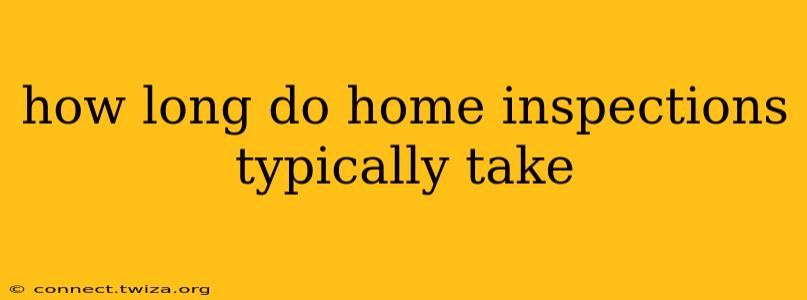Buying a home is one of the biggest financial decisions you'll ever make. A crucial part of that process is the home inspection, a vital step to uncovering potential problems before you commit to the purchase. But how long does this important process actually take? The answer isn't a simple number, but rather a range dependent on several factors.
What Factors Influence Home Inspection Time?
The duration of a home inspection isn't fixed; it's highly variable. Several key factors influence how long the inspector will spend on the property:
-
Size of the Home: A larger home with more rooms, features, and systems naturally requires more time to inspect thoroughly. A sprawling five-bedroom house will take considerably longer than a cozy one-bedroom condo.
-
Age and Condition of the Home: Older homes often require a more detailed inspection due to the increased likelihood of age-related issues. Homes in poor condition may also necessitate a more extensive examination, adding to the inspection time.
-
Complexity of Systems: The presence of complex systems like geothermal heating, advanced electrical setups, or intricate plumbing configurations adds significant time to the inspection process. Simple systems will be much quicker to assess.
-
Accessibility: Difficult-to-access areas, such as attics with low ceilings or crawl spaces with limited entry, will prolong the inspection. Inspectors need adequate time and safe access to perform a thorough job.
-
Inspector's Thoroughness: A conscientious inspector who takes the time to meticulously examine every aspect of the property will naturally take longer than one who works more quickly. While speed is important, thoroughness is paramount.
-
Weather Conditions: Extreme weather conditions, like heavy rain or snow, may necessitate delays or adjustments to the inspection schedule, impacting overall time.
How Long Can You Expect to Wait for a Report?
While the inspection itself takes a few hours, remember that you'll also need to wait for the inspector to compile the report. The timeframe for report delivery varies, but most inspectors aim to provide it within 24-48 hours, though sometimes it might take a bit longer, depending on their workload.
What Happens During a Home Inspection?
A typical home inspection covers a wide range of areas:
- Exterior: Roof, siding, gutters, downspouts, foundation, landscaping, and other external components.
- Interior: Walls, ceilings, floors, windows, doors, and other interior features.
- Plumbing: Water heater, pipes, fixtures, and drainage systems.
- Electrical: Wiring, outlets, switches, and electrical panel.
- HVAC (Heating, Ventilation, and Air Conditioning): Furnace, air conditioner, and ductwork.
- Appliances: Often included, but some inspectors charge extra for this service. This may include checking the oven, refrigerator, dishwasher, washing machine, and dryer.
The inspector will visually examine these areas, noting any potential problems or areas of concern. They will not, however, dismantle or test systems extensively.
What if the Inspection Takes Longer Than Expected?
Open communication with your inspector is key. If you anticipate the inspection will take longer than initially estimated due to the size or condition of the house, be sure to communicate this upfront. They can then adjust their schedule and expectations accordingly.
How Long Does a Home Inspection Typically Take? A Summary
While there's no magic number, most home inspections take between two and four hours. However, it’s important to factor in the time required for the inspector to prepare and deliver their comprehensive report. Remember that a thorough inspection is an investment in your peace of mind, ensuring you’re making an informed decision about one of your most significant life purchases.
